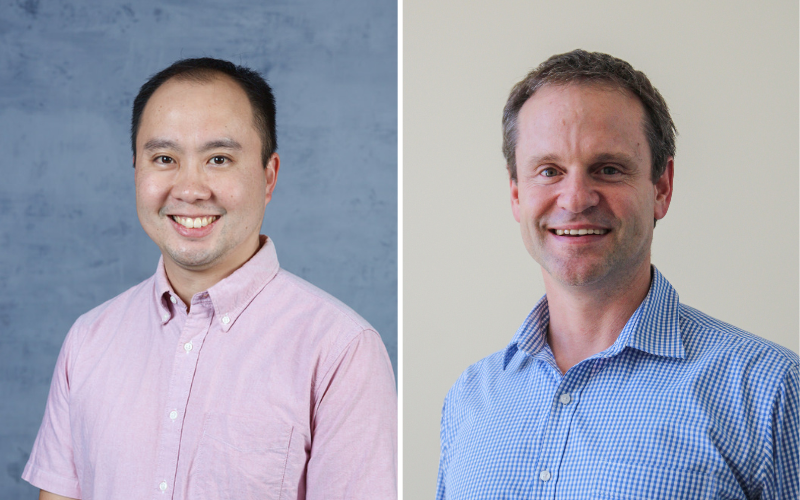
Wal-yan Respiratory Research Centre researchers will use almost $1.2 million in WA Child Research Fund grants to determine why Indigenous children develop bronchiectasis at such high rates after contracting bronchiolitis, and to test a promising novel treatment for respiratory syncytial virus (RSV).
Professor Andre Schultz (pictured right) - Head of the BREATH team at the Wal-yan Centre and a paediatric respiratory physician at Perth Children’s Hospital - has been awarded nearly $600,000 to find out how the airway surface is different between infants who develop chronic lung disease after contracting brochiolitis compared with those who don’t. It is hoped the findings will help to find ways to prevent bronchiectasis in those who are vulnerable.
Bronchiolitis is a serious lung infection caused by a virus, and is the most common reason globally for children to be hospitalised. In Australia, Indigenous children are around six times more likely than other children to be admitted in hospital for bronchiolitis.
A study from Eastern Australia found that one in five Indigenous children hospitalised for bronchiolitis were later found to have bronchiectasis - a serious lung condition that reflects permanent lung damage.
Professor Schultz said if we could find out why some Indigenous children, and not others, develop bronchiectasis we can try to help prevent the disease.
"Our project aims to generate new, feasible, evidence-based solutions that will positively alter the life trajectory of Indigenous children’s lung health. We will do this by using a comprehensive approach to determine why Indigenous children develop bronchiectasis at such high rates after contracting bronchiolitis,” Professor Schultz said.
“Our research will focus on the surface of the lower airways - the micro-environment where bronchiectasis commences and progresses - whilst at the same time considering factors related to the individual, their environment, and maternal factors expected to influence the airway surface.
If we can identify modifiable risk factors for infants, we can facilitate interventions to prevent bronchiectasis - a lifelong chronic disease with markedly shortened life expectancy.
Dr Kevin Looi (pictured left) - Senior Research Officer with the Airway Epithelial Research team at the Wal-yan Centre - has been awarded close to $600,000 to build on initial research to establish diferuloylmethane-2 (DFM-2) – more commonly known as biocurcumin - as a safe, effective and affordable anti-RSV therapeutic.
In particular, the research will investigate whether biocurcumin - a widely used dietary supplement – can be safely administered to children via an aerosol nebulized route, having a more direct impact upon compromised airways.
RSV has seen a resurgence in WA, with more than 10,000 reported infections over the winter/spring period of 2022, in contrast to only 76 infections in 2021.
The sudden influx of infections has placed additional strain on an already overwhelmed healthcare system. Although most children recover without needing specialist care, many children, particularly young infants, those born prematurely and those with underlying health issues, are admitted into paediatric care with severe RSV every year.
Dr Looi said that with limited treatments and no current vaccine for RSV, there is an urgent need for new, low-cost anti-RSV treatments to combat this resurgent threat.
“As the peak of RSV viral load in humans is up to eight days post infection, there is a sizable window of therapeutic opportunity at the onset of RSV,” Dr Looi said.
“The aim of this research is to see if biocurcumin can be safely and effectively administered to children via an aerosol nebulized route, having a more direct impact upon compromised airways. We will test this using a range of laboratory models, with the objective being to advance this work into the first stage of clinical safety trials”.
The expected outcomes from this study will contribute towards an accelerated process of developing an affordable and readily accessible biocurcumin nasal spray for everyone, which will limit the severity of RSV infections and thus, alleviate the burden on our healthcare system.
The Wal-yan Centre is a powerhouse partnership between The Kids Research Institute Australia, Perth Children’s Hospital Foundation and Perth Children’s Hospital.
Co-funded by the WA Government and the Channel 7 Telethon Trust, the WACRF supports research aimed at improving outcomes for child and adolescent health across the State.
Congratulations to Professor Schultz, Dr Looi and their project teams for being awarded these grants, which will benefit the health of kids in WA and beyond.
You can read the Medical Research Minister’s full statement here.
